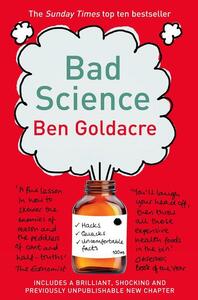You need to sign in or sign up before continuing.
Take a photo of a barcode or cover
informative
lighthearted
reflective
medium-paced
And here is a good trick: instead of a real-world outcome, like death or pain, you could always use a ‘surrogate outcome’, which is easier to attain. If your drug is supposed to reduce cholesterol and so prevent cardiac deaths, for example, don’t measure cardiac deaths, measure reduced cholesterol instead. That’s much easier to achieve than a reduction in cardiac deaths, and the trial will be cheaper and quicker to do, so your result will be cheaper and more positive. Result!
If your hypothesis comes from analysing the data, then there is no sense in analysing the same data again to confirm it.
To make money out of it, you have to make a space for yourself in the market: and to do this, you must overcomplicate it, attach your own dubious stamp.
Different people respond differently to drugs: old people on lots of medications are often no-hopers, whereas younger people with just one problem are more likely to show an improvement. So only study your drug in the latter group. This will make your research much less applicable to the actual people that doctors are prescribing for, but hopefully they won’t notice.
Although magnesium had been used to treat eclampsia since 1906, its position as the best treatment was only established a century later in 2002, with the help of the World Health Organisation, because there was no commercial interest in the research question: nobody has a patent on magnesium, and the majority of deaths from eclampsia are in the developing world.
The presentation of these purification diets and rituals has always been a product of their time and place, and now that science is our dominant explanatory framework for the natural and moral world, for right or wrong, it’s natural that we should bolt a bastardised pseudoscientific justification onto our redemption.
In some cases they will be people who turn their backs on the scientific method as a ‘flawed paradigm’; and yet it seems their great new paradigm is simply ‘unfair tests’.
Trying to construct a broad understanding of the world from a memory of your own experiences would be like looking at the ceiling of the Sistine Chapel through a long, thin cardboard tube: you can try to remember the individual portions you’ve spotted here and there, but without a system and a model, you’re never going to appreciate the whole picture.
Because in the media science is about absolute truth statements from arbitrary authority figures in white coats, rather than clear descriptions of studies, and the reasons why people draw conclusions from them.
Patients were given really rather high doses of old–fashioned antipsychotic medication (which made the new-generation drugs look as if they were better in terms of side-effects)
I found the tone withering and condescending and the content didn’t interest me
Ben's writing is enlightening and entertaining. He touches many points that a person with an inch of skepticism and curiosity would naturally feel suspicious about, but then he lands on a way to rationalise about such suspicions and illustrates them with real world examples of scams and misinformation. It is a great reminder of how little do we all know.
informative
medium-paced
I liked this and found it quite interesting but definitely a bit more science medical than I was expecting
3.5 stars- this book is at its best when it explains why scientifically proven medical advice is so elusive and why as a result, “alternative” treatments that promise quick fixes have thrived. Unfortunately that sometimes get lost in some sneakiness/deep dives into the inner workings of “alternative” medicine- to me none of that information was particularly surprising nor relevant to the general premise of this book (helping people read thru the BS and find scientifically proven treatments).
Hey - so I did a video with my review, what I thought of it (although spoiler, it's 5 stars) what I got out of it and the parts I found problomatic.
https://www.youtube.com/watch?v=6lGtTEk0Bkw
https://www.youtube.com/watch?v=6lGtTEk0Bkw
informative
medium-paced
A fascinating and sometimes chilling look at crank remedies, crackpot theories and medical frauds. Ben Goldacre has written an approachable and informative book that discusses bad science practices and the often devastating effect such methods and their practitioners can have on our health.
Goldacre leaves no stone unturned in the defence of medical science and Gillian McKeith (self-styled “nutritionist”) comes in for the most criticism. He recounts tales of horror from victims of the homeopathy fad. Neither does the medical profession get off lightly, he acknowledges and criticises the flaws in the system and what happens when big business interferes in the scientific process.
His biggest tonguelashing is reserved for the media who distort press releases and twist stories to sensationalise actual findings, leaving them barely resembling the real report. They created the travesty of Andrew Wakefield, he says (and not without justification) and they never learn their lesson, only they repeat it time and time again.
After reading this, you will never trust another science report as expressed in the media again.
See more book reviews at my blog
Goldacre leaves no stone unturned in the defence of medical science and Gillian McKeith (self-styled “nutritionist”) comes in for the most criticism. He recounts tales of horror from victims of the homeopathy fad. Neither does the medical profession get off lightly, he acknowledges and criticises the flaws in the system and what happens when big business interferes in the scientific process.
His biggest tonguelashing is reserved for the media who distort press releases and twist stories to sensationalise actual findings, leaving them barely resembling the real report. They created the travesty of Andrew Wakefield, he says (and not without justification) and they never learn their lesson, only they repeat it time and time again.
After reading this, you will never trust another science report as expressed in the media again.
See more book reviews at my blog
informative
medium-paced
Contains some interesting examples of why you shouldn't always listen to (or at least shouldn't always believe) 'the experts'.






